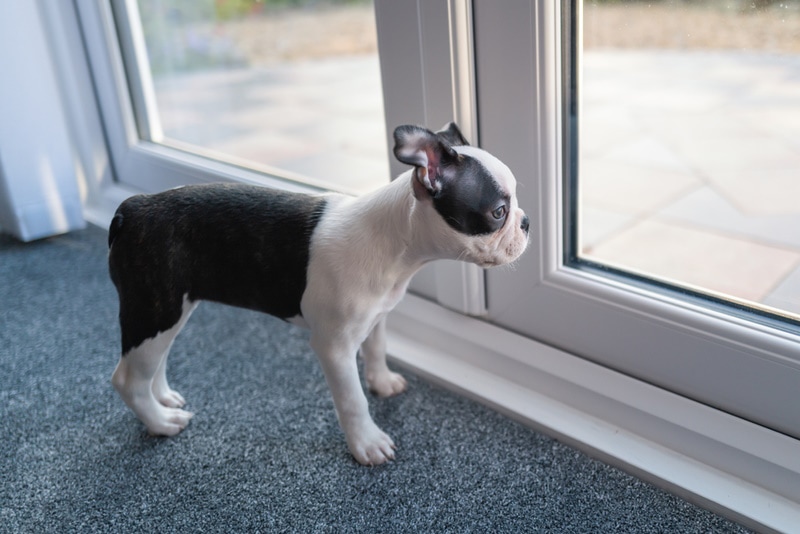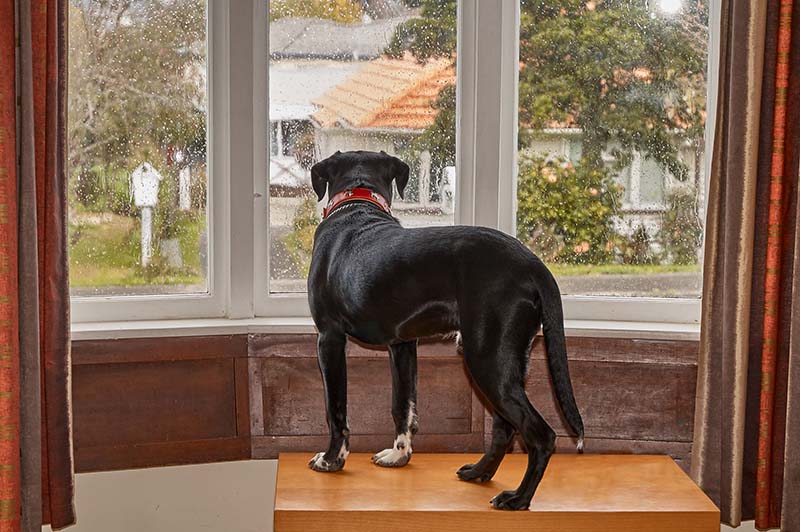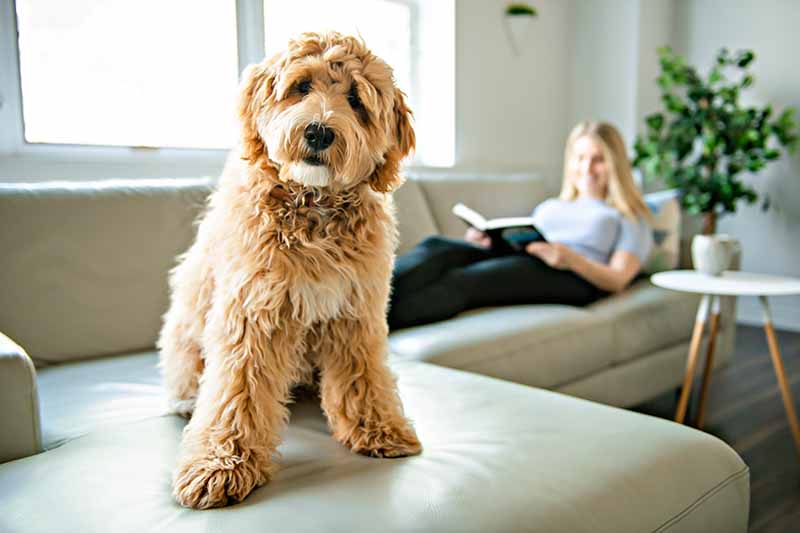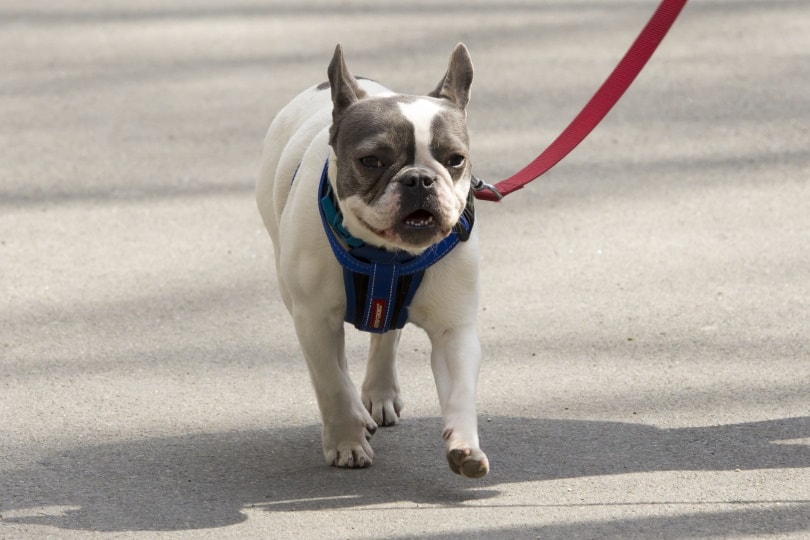
Most dogs love going outside. However, when your furry friend suddenly avoids the outdoors, you may have reason to worry. Often, dogs have a reason to avoid going outside, even when it may not seem like it to us.
Of course, avoiding the outdoors altogether isn’t usually possible for our dogs. Not only do they have to go outside to potty, but they also need to get exercise. Plus, not going outside at all just doesn’t seem like a very full life for our best friends.
The first step to solving this problem is to figure out why your dog won’t go outside, and that’s exactly what we’ll help you do in this article.


The 5 Reasons Your Dog Doesn’t Want to Go Outside
1. Medical Reasons


Sometimes, dogs may not want to go outside due to an injury or illness. Most of the time, these health issues make it harder for the dog to get around, which prevents them from heading outside.
Health issues:
- Arthritis: Arthritis is a common condition in older dogs that causes pain and stiffness in the joints. This can make it difficult for dogs to walk or run, and they may be reluctant to go outside because it hurts.
- Hip Dysplasia: Hip dysplasia often causes arthritis in a dog’s hips. However, it is genetic and often occurs in relatively young dogs. It can cause pain and lameness, which may make your dog reluctant to go outside.
- Injuries: Any injuries to a dog’s paws or legs can cause them to avoid going outside. These may make it harder for your pet to move and cause pain. You’ll need to be extra cautious, as moving may make the injury worse.
In many cases, the only way to get your dog up and moving again is to get treatment from a vet. You may need to provide your dog with lots of assistance getting outside until they are healed. For instance, you may even need to carry them outside to use the bathroom, especially if their condition is more serious.
2. Fear
Dogs can become fearful of things outside. There are often more noises, people, and animals outside than inside our homes. Therefore, the outdoors can be a source of anxiety for many canines. Even if your dog wasn’t scared of the outdoors before, they can become anxious due to a scary event that occurred outside.
Even things that don’t seem that scary to us can cause anxiety for our dogs.
If your dog is afraid of something outside, it’s important to identify their source of fear. Once you know what they’re scared of, you can slowly desensitize them to it. Often, this involves gently exposing them to whatever object or situation they’re scared of until they no longer fear it. While this is a long process, it’s essential to conquering your dog’s fear.
3. Weather


Sometimes, dogs don’t want to go outside due to the hot or cold weather. Some dogs don’t like the rain, while others may refuse to touch snow. Either way, many dogs will dislike certain weather conditions, just like us.
If your dog is reluctant to go outside because of the weather, your best option is usually to wait it out. If it’s raining or snowing, you may be able to wait until the weather passes. Sometimes, you can dress your dog to make the weather less of a concern.
Luckily, all weather conditions do pass eventually.
4. Boredom
Sometimes, dogs may not like being outside because it’s boring or unrewarding. This is especially true if your dog is often alone outside for several hours. Once you let your dog in, they may be unwilling to go out again.
There are several things you can do to make outside a bit more interesting to your canine. Firstly, try playing some outside games that your dog may like, such as fetch. Just getting outside with your dog can help reduce boredom. You can also put items outside that may make your dog more interested, such as puzzle feeders or new toys.
5. Lacking Attention


Most modern dogs are bred to be very people-oriented and function as companion animals. In the past, some dog breeds were able to spend all of their time outside with their flock and never want for human interaction. However, most modern dogs don’t fall into this category.
While having a person-oriented dog means you get lots of attention, it also means that you have to give your dog lots of attention. If you don’t, they may develop bad behaviors in an attempt to get the attention they need.


How to Tell if a Dog is Scared to Go Outside
Dogs have lots of signals that help them communicate with us. However, some of these are easier to read than others. It’s easy to mistakenly believe that a dog is scared of going outside when they’re really scared of something else.
For instance, your dog may actually be scared of walks—not the outdoors itself. Figuring out what exactly your dog is scared of can be a bit difficult. However, with some work, you can often determine the underlying cause.
Approach it a bit like an investigation. Is your dog scared to go outside everywhere? Do the fear signals start when you get out the leash? Try taking your dog outside at different times of the day. Aging dogs may experience vision loss that makes it harder to see at night, which may cause fear.
If you usually take your dog outside on a leash, try using a different collar or leash. Invest in a harness. Sometimes, dogs can be fearful of how they’re taken outside, not necessarily the outdoors.
If you need help, a professional behaviorist can sometimes be helpful. However, these are expensive, especially if you need them to come to your house. Therefore, we highly recommend trying to figure out if your dog is truly scared of the outside or not by yourself, only eliciting professional help if you really need it.


Tips to Help Dogs Who are Reluctant to Go Outside
If your canine seems reluctant to go outside, it is completely possible to get them excited about their outdoor trips again. However, this does take plenty of time, patience, and the right technique. It can depend on the underlying cause, too. If your dog is injured, they may feel ready to go outside as soon as they are healed.
However, if their uncertainty is due to a traumatic event, it may take much longer before they’re comfortable being outside again.
Here are some tips to help you ease your dog back outside:
- Be patient and consistent. It may take a while for your dog to become comfortable with going outside again. Pushing things can make them even more scared. It’s important to go extremely slowly and have lots of patience.
- Start slow. Don’t push your dog to go outside when they are clearly anxious or struggling. Start by taking them outside for very short periods of time and slowly increase it as they are able. For dogs that are very scared, you may want to start by just opening the door and rewarding them for standing near it.
- Make it positive. Be sure that the outing is always bringing lots of treats and praise. Active dogs are often very toy-driven and may enjoy some playtime.
- Find a quiet, safe place. For very scared dogs, you may need to make the outside area particularly quiet and safe. You can try setting up some boundaries along your property so that your dog cannot see humans or other dogs walking by.
- Don’t force it. We’ve already said this several times, but it is worth repeating: don’t force it. If you force your dog to go outside when they are scared or injured, it will likely make everything worse.


Conclusion
If your dog is scared of going outside, it can be a bit confusing. Often, it’s a stereotype that dogs love being outside, so it can seem strange when our dog suddenly wants to stick inside.
Sudden changes in behavior should always call for a vet trip. Even if your dog looks fine, sudden behavioral changes often mean there is an underlying health problem that needs to be solved. You need to ensure your dog has a clean bill of health before moving forward with desensitization.
If your dog is healthy, then their sudden (or lasting) fear may be due to all sorts of reasons, such as a traumatic event or boredom.
Featured Image Credit: Christine Bird, Shutterstock



